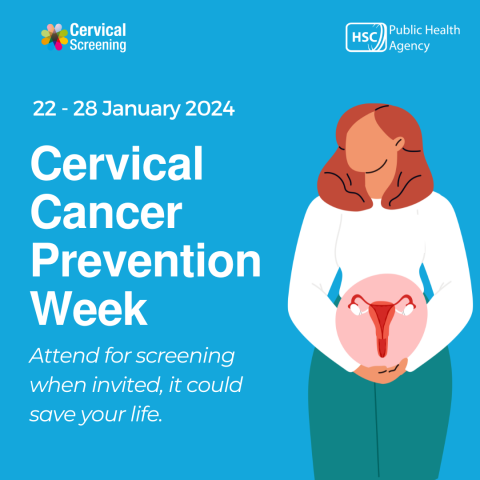Cervical Cancer Prevention Week – attend for screening when invited

This Cervical Cancer Prevention Week (22–28 January), the Public Health Agency (PHA) is reminding women of the importance of attending for cervical screening when invited.
This comes after the Northern Ireland Cervical Screening Programme introduced full primary HPV screening into the cervical screening pathway in December, which will increase the ability to detect early cell changes that could lead to cancer
Dr Tracy Owen, Deputy Director of Public Health at the PHA, said: “Cervical cancer is one of the few cancers that can be prevented thanks to screening, so it is really important to attend for cervical screening when invited. It could save your life.”
Between 2016 and 2020 in Northern Ireland there was an average of 81 people diagnosed with cervical cancer each year and around 21 deaths per year. Nearly all cervical cancers are caused by persistent infection with human papillomavirus, known as HPV.
Dr Owen continued: “HPV is a very common virus – about 8 out of 10 people catch it at some time in their lives. After you attend for screening, your sample will be checked for high-risk types of HPV in the first instance and if the virus is found to be present, the sample will then go for further examination. Testing for HPV is a more accurate and effective way to identify women at risk of cell changes that could go on to develop into cancer if left untreated. This model is also enabling results to be delivered for women much more quickly.”
Cervical screening, as with all screening programmes, doesn’t guarantee that cancer will not develop in the future, although it significantly reduces the chance. A cancer could develop between screening tests, and there is a small chance that the screening test misses some changes in the cervix.
“As well as attending screening appointments, we would also urge people to familiarise themselves with the signs and symptoms of cervical cancer, including vaginal bleeding after sex, between periods or after the menopause; vaginal discharge that is not normal for you; persistent back or tummy pains; and/ or pain during sex,” Dr Owen said.
“You may feel worried if you do notice any of these symptoms, but it’s important to be checked by a GP if you do. If you feel something isn’t normal at any time, contact your GP.
“The other important way of helping to protect against future cervical cancer is through the human papillomavirus (HPV) vaccine which is offered to all girls and boys in Year 9 in school.
“The HPV vaccine helps protect against two types of the virus that cause most cases of cervical cancer. If you have been eligible for the vaccine but have not received it in school, you can still receive it free of charge until the age of 25. You can find out if you are eligible by contacting your GP.”
Please see the following websites for further information.
- PHA site: www.pha.site/CervicalScreening1
- NI Direct – Cervical Screening: www.nidirect.gov.uk/articles/cervical-screening
- NI Direct – human papillomavirus (HPV): www.nidirect.gov.uk/conditions/human-papillomavirus-hpv
- Jo’s Cervical Cancer Trust: www.jostrust.org.uk/
- Find out more about the change to primary HPV testing by watching the following animation – www.vimeo.com/892265209?share=copy
